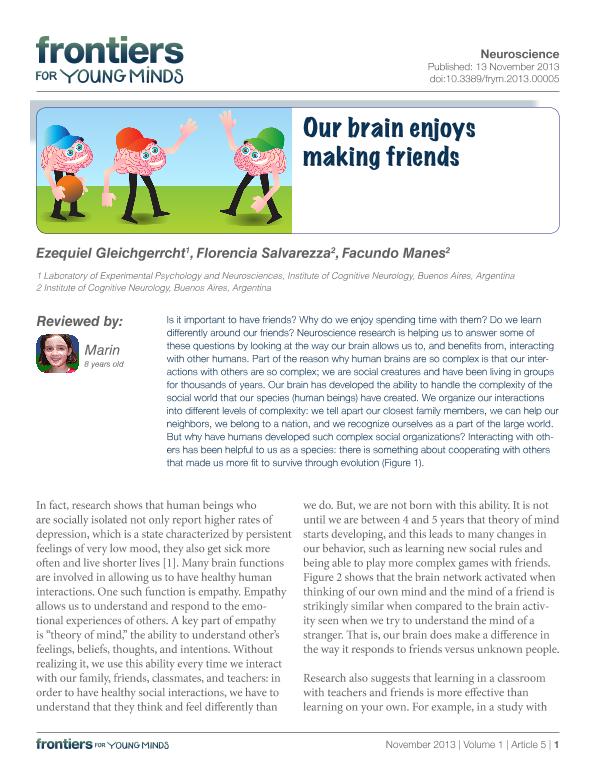Mostrar el registro sencillo del ítem
dc.contributor.author
Gleichgerrcht, Ezequiel

dc.contributor.author
Salvarezza, Florencia
dc.contributor.author
Manes, Facundo Francisco

dc.date.available
2017-11-17T17:40:20Z
dc.date.issued
2013-11
dc.identifier.citation
Gleichgerrcht, Ezequiel; Salvarezza, Florencia; Manes, Facundo Francisco; Our brain enjoys making friends; Frontiers; Frontiers for Young Minds; 1; 11-2013; 1-5; 5
dc.identifier.uri
http://hdl.handle.net/11336/28440
dc.description.abstract
Is it important to have friends? Why do we enjoy spending time with them? Do we learn differently around our friends? Neuroscience research is helping us to answer some of these questions by looking at the way our brain allows us to, and benefts from, interacting with other humans. Part of the reason why human brains are so complex is that our interactions with others are so complex; we are social creatures and have been living in groups for thousands of years. Our brain has developed the ability to handle the complexity of the social world that our species (human beings) have created. We organize our interactions into different levels of complexity: we tell apart our closest family members, we can help our neighbors, we belong to a nation, and we recognize ourselves as a part of the large world. But why have humans developed such complex social organizations? Interacting with others has been helpful to us as a species: there is something about cooperating with others that made us more ft to survive through evolution.
dc.format
application/pdf
dc.language.iso
eng
dc.publisher
Frontiers

dc.rights
info:eu-repo/semantics/openAccess
dc.rights.uri
https://creativecommons.org/licenses/by-nc-sa/2.5/ar/
dc.subject
Friends
dc.subject
Social Complexity
dc.subject.classification
Inmunología

dc.subject.classification
Medicina Básica

dc.subject.classification
CIENCIAS MÉDICAS Y DE LA SALUD

dc.title
Our brain enjoys making friends
dc.type
info:eu-repo/semantics/article
dc.type
info:ar-repo/semantics/artículo
dc.type
info:eu-repo/semantics/publishedVersion
dc.date.updated
2017-11-17T13:47:42Z
dc.identifier.eissn
2296-6846
dc.journal.volume
1
dc.journal.pagination
1-5; 5
dc.journal.pais
Suiza

dc.description.fil
Fil: Gleichgerrcht, Ezequiel. Instituto de Neurología Cognitiva; Argentina
dc.description.fil
Fil: Salvarezza, Florencia. Instituto de Neurología Cognitiva; Argentina
dc.description.fil
Fil: Manes, Facundo Francisco. Instituto de Neurología Cognitiva; Argentina. Consejo Nacional de Investigaciones Científicas y Técnicas; Argentina
dc.journal.title
Frontiers for Young Minds
dc.relation.alternativeid
info:eu-repo/semantics/altIdentifier/doi/http://dx.doi.org/10.3389/frym.2013.00005
dc.relation.alternativeid
info:eu-repo/semantics/altIdentifier/url/http://kids.frontiersin.org/article/10.3389/frym.2013.00005
Archivos asociados
